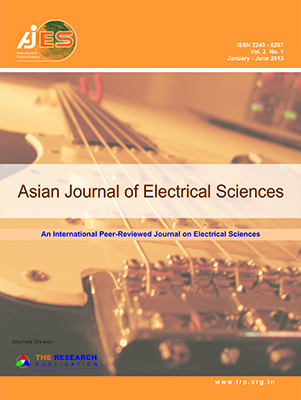The Article Processing Charge (APC) is waived for submissions until 28 February 2026.
About the Journal
Asian Journal of Electrical Sciences
Materials Science: Electronic, Optical and Magnetic Materials
Computer Science: General Computer Science
Asian Journal of Electrical Sciences is a half-yearly, double-blind peer-reviewed, gold open-access journal previously published by The Research Publication and currently published since 2024 by Centre for Research and Innovation, The Bharath Social and Research Foundation, a non-governmental organization. The Journal is promoting and publishing original high-quality research in all disciplines of Electrical, Electronics, and Computer Science and Engineering. The Journal stresses on academic excellence, research rigidity, knowledge distribution, and reciprocated scholarly efforts to endorse theoretical, experimental, and practical research at national and international levels.
All the submissions will be peer-reviewed by the panel of experts associated with the particular field of research. Submitted papers should meet the internationally accepted criteria and manuscripts should follow the style of the journal.
Abstracting and Indexing
Asian Journal of Electrical Sciences is indexed in J-Gate, Google Scholar, Scilit, CrossRef, Library of Congress and WorldCat. Previously, it was on the UGC Approved list of Journals (No. 63226) until June 13, 2019.
Asian Journal of Electrical Sciences is dedicated to maintaining the highest standards of ethical conduct throughout the publication process. We adhere strictly to the guidelines and standards set by the Committee on Publication Ethics (COPE). These guidelines help us ensure best practices in areas such as duplicate publication, conflicts of interest, patient consent, and more. For detailed information on these policies, please refer to author guidelines.
The journal advocates for open access (OA) publishing, which provides free and unrestricted online access to research outputs of journal articles. Open access content is accessible to everyone without the need for subscription fees or registration, with articles available immediately upon publication. This ensures that researchers, students, scholars, and the public can access the latest research content anytime, anywhere. For more details, please visit: https://ajesjournal.org/index.php/ajes/openaccesspolicy
The journal is an Open Access (OA) publication, with articles distributed under the Creative Commons Attribution-NonCommercial-ShareAlike 4.0 License (CC BY-NC-SA 4.0). This license permits others to remix, adapt, and build upon the work for non-commercial purposes, provided proper credit is given and the new creations are licensed under the same terms. It allows authors to share their work widely while retaining certain rights.
Repository Policy
Authors are encouraged to deposit their published articles in any repository. After publication, they are allowed and encouraged to share their work online, such as in institutional repositories or on their personal websites. Doing so can lead to fruitful discussions, earlier and more frequent citations, and enhanced accessibility and reproducibility of research findings. Asian Journal of Electrical Sciences is archived in PKP Preservation Network.
Copyright of Published Material
The journal requires authors to sign a consent declaration form, where they accept responsibility for releasing the material to the publisher on behalf of all co-authors. While the author retains the copyright to the content, they transfer all licensing and publishing rights to the publisher. The author grants the publisher the exclusive right to commercially utilize the article for the full legal term of the copyright. This transfer includes the non-exclusive right to reproduce and distribute the article in various forms, such as reprints, translations, photographic reproductions, microform, electronic formats (both online and offline), or any other similar reproductions.
Plagiarism
Plagiarism includes the uncredited use of another’s work or presenting an existing idea or product as new and original. This also extends to self-plagiarism, which involves the redundant reuse of one’s own previously published work without proper citation in a new manuscript. Asian Journal of Electrical Sciences treats self-plagiarism as a form of plagiarism. To prevent this, we provide our editors and reviewers with Turnitin software as part of our manuscript submission system.
Innovative Specialization
Centre for Research and Innovation is a scholarly publisher offering both print and online publications, specializing in engineering, science, technology, and humanities journals as an Open Access (OA) publisher.


